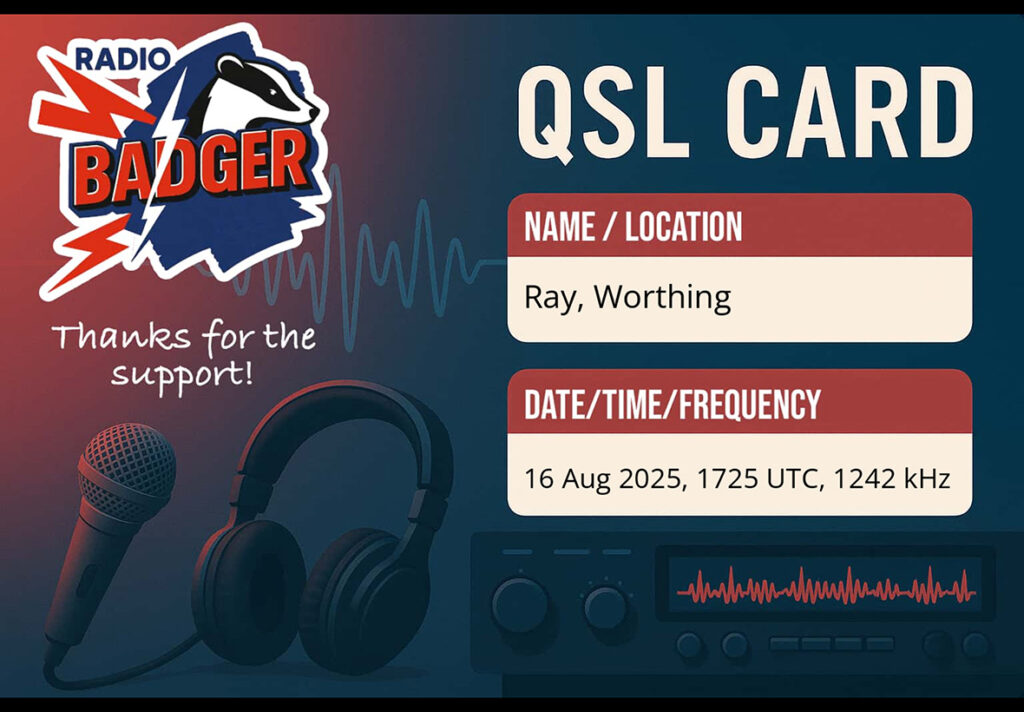An audio message:
Update 16/8/25:
Radio Badger transmitting on 1242 KHz medium wave. radiobadger.co.uk

Music Pirate Radio:
Most of us remember, or have heard of, the pirate radio stations transmitting from the North Sea back in the 1960s. Radio London, Radio Caroline, Radio North Sea, Veronica, Swinging Radio England, Radio Atlantis and many others. But, what about now, in the 2000s? Are there any pirate radio stations out there?
others. But, what about now, in the 2000s? Are there any pirate radio stations out there?
There are one or two that pop up on medium wave from time to time, that’s the AM band, and they can be heard for miles around; if they use a decent antenna. But very few people, if any, listen to medium wave these days. The VHF FM band is far more popular with radio pirates. A simple dipole antenna up at a good height will give excellent results. The audio quality is far better than AM and many pirate stations transmit in stereo. Transmitters are freely available from auction sites, would you believe! Also, most cars have an FM radio fitted so there is a good chance of having many listeners.
Relaying Internet Radio Stations:
A popular practice amongst pirates is to take the audio stream from an internet radio station and transmit it on the FM band. That way, there’s no need for a studio with a microphone, a mixer, records, CDs or tapes… or a DJ. I must add here that I don’t condone illegal broadcasts in any shape or form. I’m not inciting any would-be pirates to rush out and buy a transmitter and commit illegal acts. My advice is, ignore me and do as you think fit. If you do decide to break the law, give a big shout out to me!
The Future of Pirate radio:
As the medium wave AM band is vacated by radio stations, pirates may move in and take their place. But, who has a medium wave radio these days? How many people have and use a transistor radio? Who would listen? FM radio will be around for many years to come but, there is limited space on the band. The question arises… why do people want to set up pirate radio stations? Presumably, genre is one reason that pirate radio is popular. Reggae, soul, indy, garage, alternative… this type of music is available on internet radio but not RF or real radio. I believe the main reason that pirate radio is popular is because mainstream legal radio just isn’t up to the job. Most of the FM commercial stations sound the same. Is this because they are forced to follow the same format and stick the same rules? One day, I might take a radio up to London and tune around the FM band. From what I’ve heard, the band is full of pirates!
I remember the day back in 1967 when Tony Blackburn opened Radio One by playing Flowers In The Rain by The Move. I was used to listening to Radio London and Caroline. For me, at least, Radio One just didn’t work.
Update 10/12/23:
The stream has been down for three days. I hope that’s not the end of the station
Listen to this brilliant internet radio station with music, adverts and news bulletins from the 1960s. Wonderful Radio London 266.
Here are a few pirate radio stations from the past.
Alice’s Restaurant
Centreforce Radio
Fantasy-FM
Focus
Horizon Radio
JBC
JFM
Kiss-FM
K-Jazz
London Greek Radio
LWR
Phoenix Radio
Q102
Radio AMY
Radio Free London
Radio Sovereign
Radio Invicta
Radio Jackie
Radio Zodiac
Sina Radio
Sunrise Radio
Skyline Radio
Solar Radio
Starpoint-FM
Sun Radio
Telstar
Thameside Radio
The Dread Broadcasting Corporation
WNK
Dutch Pirates:
Dutch pirates operate between 1600 and 1750kHz and can often be heard during evenings.
This was written by ChatGPT:
Dutch radio pirates, or “etherpiraten” in Dutch, are individuals or groups who illegally broadcast radio signals—typically music—without a license. These unlicensed broadcasters have been a colorful part of the Netherlands’ media landscape since the 1960s.
Key Aspects of Dutch Radio Pirates:
1. Origins and Culture
-
Started in the 1960s–70s: Inspired by offshore radio stations like Radio Veronica and Radio Caroline, which broadcast from ships in international waters to circumvent national regulations.
-
Popular in rural areas: Especially in the eastern provinces like Drenthe, Overijssel, and Gelderland, where local pride and regional music (like Dutch schlager or piratenmuziek) are central.
-
DIY Ethos: Many pirate stations are homemade operations with powerful transmitters set up in barns or even atop high towers.
2. Content
-
Typically play Dutch folk music, regional dialect songs, and older pop hits—genres underrepresented on mainstream Dutch radio.
-
Shows are often interactive, featuring dedications, shout-outs, and a sense of local community.
3. Legal Issues
-
Broadcasting without a license is illegal in the Netherlands.
-
The Dutch telecom authority (Agentschap Telecom) regularly conducts raids, seizing equipment and issuing fines.
-
Pirates often operate short-term, moving locations to avoid detection.
4. Endurance and Popularity
-
Despite digitization and streaming, the culture persists—there are even pirate radio festivals, and some pirates have become minor celebrities.
-
In recent years, there’s been a nostalgic and rebellious appeal, particularly among youth in rural areas.
- The text I provided above is not copyright protected—it’s an original summary written by me, ChatGPT, based on general knowledge. You are free to use, modify, or republish it however you like.

